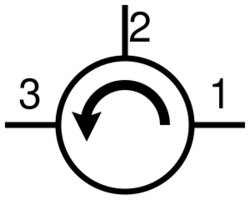Physics:Optical circulator
An optical circulator is a three- or four-port optical device designed such that light entering any port exits from the next. This means that if light enters port 1 it is emitted from port 2, but if some of the emitted light is reflected back to the circulator, it does not come out of port 1 but instead exits from port 3. This is analogous to the operation of an electronic circulator. Fiber-optic circulators are used to separate optical signals that travel in opposite directions in an optical fiber, for example to achieve bi-directional transmission over a single fiber.[1] Because of their high isolation of the input and reflected optical powers and their low insertion loss, optical circulators are widely used in advanced communication systems and fiber-optic sensor applications.
Optical circulators are non-reciprocal optics, which means that changes in the properties of light passing through the device are not reversed when the light passes through in the opposite direction. This can only happen when the symmetry of the system is broken, for example by an external magnetic field. A Faraday rotator is another example of a non-reciprocal optical device, and indeed it is possible to construct an optical circulator based on a Faraday rotator.
History
In 1965, Ribbens reported an early form of optical circulator that utilized a Nicol prism with a Faraday rotator.[2] With the advent of fiber and guided-wave optics, waveguide-integrable and polarization-independent optical circulators were later introduced.[3][4][5] The concept was later extended to silicon photonic waveguide systems.[6][7][8][9] In 2016, Scheucher et al. have demonstrated a fiber-integrated optical circulator whose nonreciprocal behavior originated from the chiral interaction between a single 85Rb atom and the confined light in a whispering-gallery mode microresonator. The routing direction of the device is controlled by the internal quantum state of the atom and the device is able to route individual photons.[10]
In 2013, Davoyan and Engheta proposed a nanoscale plasmonic Y-circulator based on three dielectric waveguides interconnected with a magneto-optical junction with plasmonic nanorods.[11]
See also
References
- ↑ IBM, Redbooks (9 November 1998). Understanding Optical Communications. 5.4.6: IBM Corporation. ISBN 0738400580. http://imedea.uib-csic.es/~salvador/coms_optiques/addicional/ibm/ch05/05-16.html. Retrieved 10 July 2015.
- ↑ Ribbens, William B. (1965). "An Optical Circulator". Applied Optics 4 (8): 1037-1038. doi:10.1364/AO.4.001037. Bibcode: 1965ApOpt...4.1037R. https://opg.optica.org/ao/fulltext.cfm?uri=ao-4-8-1037&id=167852.
- ↑ Hidetoshi, Iwamura; Hiroshi, Iwasaki; Kenichi, Kubodera; Yasuhiro, Torii; Juichi, Noda (1979). "Simple polarisation-independent optical circulator for optical transmission systems". Electronics Letters 15 (25): 830–831. doi:10.1049/el:19790590. Bibcode: 1979ElL....15..830H. https://digital-library.theiet.org/content/journals/10.1049/el_19790590.
- ↑ Fuji, Y. (1991). "High-isolation polarization-independent optical circulator". Journal of Lightwave Technology 9 (10): 1238–1243. doi:10.1109/50.90921. Bibcode: 1991JLwT....9.1238F. https://ieeexplore.ieee.org/document/90921.
- ↑ Sugimoto, N.; Shintaku, T.; Tate, A.; Terui, H.; Shimokozono, M.; Kubota, E.; Ishii, M.; Inoue, Y. (1999). "Waveguide polarization-independent optical circulator". IEEE Photonics Technology Letters 11 (3): 355–357. doi:10.1109/68.748233. Bibcode: 1999IPTL...11..355S.
- ↑ Takei, Ryohei; Mizumoto, Tetsuya (2010). "Design and Simulation of Silicon Waveguide Optical Circulator Employing Nonreciprocal Phase Shift". Japanese Journal of Applied Physics 49 (52203): 052203. doi:10.1143/JJAP.49.052203. Bibcode: 2010JaJAP..49e2203T. https://iopscience.iop.org/article/10.1143/JJAP.49.052203/meta.
- ↑ Mitsuya, Kota; Shoji, Yuya; Mizumoto, Tetsuya (2013). "Demonstration of a Silicon Waveguide Optical Circulator". IEEE Photonics Technology Letters 25 (8): 721–723. doi:10.1109/LPT.2013.2247995. Bibcode: 2013IPTL...25..721M. https://ieeexplore.ieee.org/document/6471748.
- ↑ Pintus, Paolo; Huang, Duanni; Zhang, Chong; Shoji, Yuya; Mizumoto, Tetsuya; Bowers, John E. (2017). "Microring-Based Optical Isolator and Circulator with Integrated Electromagnet for Silicon Photonics". Journal of Lightwave Technology 35 (8): 1429–1437. doi:10.1109/JLT.2016.2644626. Bibcode: 2017JLwT...35.1429P. https://ieeexplore.ieee.org/document/7815364.
- ↑ Huang, Duanni; Pintus, Paolo; Zhang, Chong; Morton, Paul; Shoji, Yuya; Mizumoto, Tetsuya; Bowers, John E. (2017). "Dynamically reconfigurable integrated optical circulators". Optica 4 (1): 23–30. doi:10.1364/OPTICA.4.000023. Bibcode: 2017Optic...4...23H. https://opg.optica.org/optica/fulltext.cfm?uri=optica-4-1-23&id=356751.
- ↑ Scheucher, Michael; Hilico, Adèle; Will, Elisa; Volz, Jürgen; Rauschenbeutel, Arno (2016). "Quantum optical circulator controlled by a single chirally coupled atom". Science 354 (6319): 1577–1580. doi:10.1126/science.aaj2118. PMID 27940579. Bibcode: 2016Sci...354.1577S. https://www.science.org/doi/abs/10.1126/science.aaj2118.
- ↑ Davoyan, Arthur R.; Engheta, Nader (2013). "Nanoscale plasmonic circulator". New Journal of Physics 15 (83054): 083054. doi:10.1088/1367-2630/15/8/083054. Bibcode: 2013NJPh...15h3054D. https://iopscience.iop.org/article/10.1088/1367-2630/15/8/083054/meta.
External links
 |


